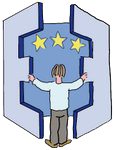Chemistry at the ESS
In the integrated sciences course, the students from S1 to S3 receive scientific education based on a combination of biology, chemistry and physics. From S4 to S5, these subjects are taught separately for a total of two periods per week. Chemistry is therefore a compulsory subject until the end of S5.
The scientific concepts discussed in S4 and S5 serve as a solid basis, which is expanded upon in the S6 and S7 syllabi. The programs covered in S4 and S5 form a single coherent unit, which allows great freedom in the coverage of the concepts in S4 and S5, provided that students have received an education meeting the objectives in all sections. A harmonized S5 final examination is then administered to ensure that all students have met the required learning objectives across all of the language sections.
In S5, students will need to consider their choice of options for the S6 year, and thus they then have the option to continue with chemistry depending on their baccalaureate profile. The choice that is made for S6 is then carried into S7. Chemistry taught in the last two years of high school is based on four periods per week. The program delves deeper into the knowledge acquired during S4 and S5, and helps build a solid foundation for further studies in chemistry and the other sciences at European universities. For example, many of the chemical concepts encountered in S6 (e.g. theoretical chemistry) and S7 (e.g. organic chemistry) are taught at university in France.
Of particular note is that the splitting of the science classes for S4 and S5, and the small class sizes in S6 and S7, ensures that teaching via experimentation for the S4/S5 classes as well as the comparatively smaller S6/S7 classes is regular and enhanced by the use of quality modern equipment.
Finally, S6 and S7 students also have the opportunity to take a supplementary course “chemistry laboratory” for 2 periods per week. The laboratory course is a hands-on practical class where established chemical concepts are further explored and new ones are investigated, and it is taken in addition to the 4 period chemistry option.

